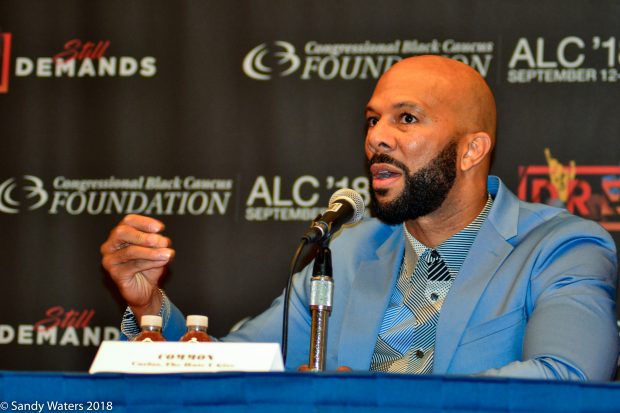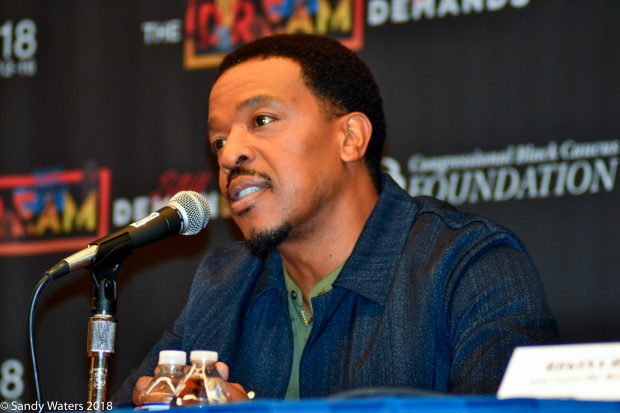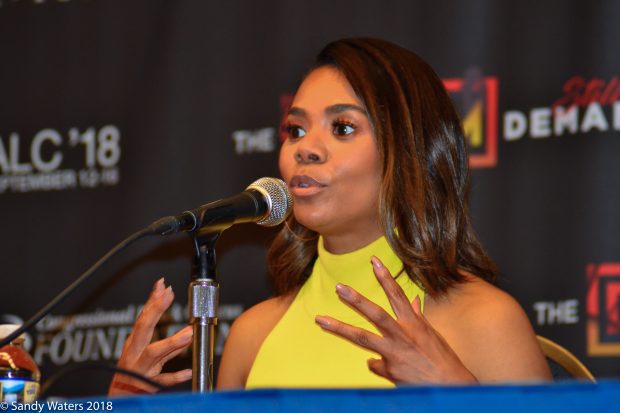The Hate U Give
The rapper Tupac Shakur once broke down the acronym for his mantra “T.H.U.G. L.I.F.E.”: “The hate you gave little infants [expletive] everybody,” he said of systematic injustices. “What you feed us as seeds, grows and blows up in your face.” More than twenty years after his death, his message was fused into,” Angie Thomas’ best-selling 2017 novel about an African American teenager who experiences those inequalities in “The Hate U Give”.
There are films that were made that barely amuse your intellect and there are films that punch you right in the gut because they depict life experiences that impact lives. In other words, films people can relate to. This film brings forth a river of emotions and makes every nerve in your body feel what the character feels.
I surveyed many people before seeing this film and some claim that “they didn’t want to see the film because it features the same ole genre of black youth being killed”. But there’s much more going on here than what the trailer depicts. Black parents in every African American community must prepare their children for a world that judges them by the color of their skin. “The Hate U Give” is a socially conscious film, structured with multi layers of subplots that are emotionally driven. I wish I had brought a box of Kleenex because no one likes soggy popcorn. If the goal of this narrative is to make a person cry, it achieved just that. There wasn’t a dry eye in the theater where I saw this film.
The narrative includes symbolism, motifs, and themes that are relatable to black urban communities across the U.S. that experience the inequalities within the justice system. The film arouses inner emotions and makes one feel and connect to a highly debatable topic: race and police brutality.
Director, George Tillman Jr. quotes: “I want the audience on both sides to really converse and be able to let this be a conversation starter. I want them to be able to listen to one another and be able to find themselves in the movie. And even if it’s good or bad, you know, looking at ways to improve, and at the same time finding your own activist, finding your own way and being able to not be afraid to be yourself”.

“The Hate U Give” features a star-studded cast including Amandla Stenberg, Regina Hall, Russell Hornsby, and Rapper, Common — and a commanding story that confronts race, police brutality, and black identity. The opening scene is a very powerful assertion of blackness, both in the splendor of it and the struggle. Starr’s voice-over introduces the theme of survival, a ritual given by her father further in the film that describes a custom of what many Black parents coined “The Talk”.
Russell Hornsby plays Maverick, Starr’s father. He delivers a painful speech called “the talk” to Starr, and her two brothers, Seven (Lamar Johnson) and Sekani (TJ Wright). The talk refers to how black kids must act if they ever get accosted by the police. As an ex- panther, he wants to instill in kids a sense of pride and the doctrines of the Black Panther Party’s Ten-Point Program. Maverick is adamant about this rite of passage because he knows that the system is unjust and African-American children must learn how to navigate and survive in a preponderate white world. This dominate discourse is far too familiar because of how the authority handles black youth.
Starr Carter, played by Amandla Stenberg, isn’t considered a “break-out” character any longer. Amandla’s artistry embodies a range that is multidimensional and meticulous. She plays a character that is compounded with joy, sadness, bravery, self-doubt and bouts of confidence; introversion and outspokenness.
Twenty minutes into the film, a plot twist changes a playful conversation between two teenagers who knew each since their sandbox years to a frantic dismal event. At the hands of a police officer, Starr witnesses the deadly shooting of a childhood friend Khalil, played by actor Algee Smith and at this pivotal moment she is unwillingly forced into activism. Now she is confronted with fear and pressure from the entire Garden Heights community. She must be valiant and take a stance for justice for her beloved friend who just died by her side.
The character, Starr Carter repetitively shifts among two worlds: the poor, predominately African American neighborhood where she resides, and the wealthy, Williamson Prep school where she and her brothers attend. Starr conceals her blackness around her white school mates because she doesn’t want to be labeled as being ghetto. However, her white friends casually use hood slang that she shifts in their presence. (“Slang makes them cool; it makes me hood,” she perceives). In real life, Amandla was raised in a predominately black neighborhood in Los Angeles, and attended a privileged, primarily white school. When Amandla read Angie Thomas’s book, sequentially, she was “rather stunned”. Many of the details felt way too familiar.
Even though Starr struggles with these issues, she has a Caucasian boyfriend, Chris (K J Kapa) that she admires. So, color doesn’t prevent her from experiencing love and friendship, even though she still hides her doubts and fears. Chris tries to ensure her that color didn’t matter to him, but in the same breath was angered when Starr held back from telling him about the murder. The most riveting scene is when she finally confronts her friend and basketball team mate, Hailey (Sabrina Carpenter) for discounting Khalil’s murder by staging a guised rally just to skip school for a day.

Lisa Carter, Starr’s mother played by Regina Hall is the quiet storm and the voice of reason, as well as the essence of a strong woman. Even though she is strong, she lets Maverick lead and make decisions. Lisa reveals her back story when she follows a tradition set by her parents. When Lisa was young girl, her family moved out of Garden Heights to afford them a better life, but she moves back as an adult. However, she makes a great effort to protect her children and escape the perils of the ghetto by sending her kids to a school outside of the neighborhood, so they will have an equal chance in life. Lisa has a great desire to move when turmoil heightens, and her family is threatened.
Common has a small role as Starr’s uncle Carlos, a police officer. Because of his position some tension builds up between him and Starr. It was reduced to a tête-à-tête later in the film in which he defends police shootings to Starr by explaining what an officer might be thinking when interacting with a civilian. This conversation could have gone south because of his ideology, but with a terse rebuttal from Starr, the plot forges ahead.
Another plotted point that unites both themes are the unjust actions of the authority. Maverick is forced down to the ground and gets patted down in front of his wife and kids in public, in front of a restaurant. Race unites this theme of injustice because pervasive racism inhibits African- Americans from procuring justice at a disproportionate rate. Starr and Maverick mainly focused on bringing justice not only for Khalil, but also for other African-Americans and troubled groups. The narrative unites themes of injustice, community, belonging, race, bravery, family. “The Hate You Give” illustrates the intricacies of what it’s like to walk in The Carter’s shoes and other families in the global black community.
“The hate you gave little infants [expletive] everybody. What you feed us as seeds, grows and blows up in your face.” Tillman marries Tupac’s lyrics by paralleling the Carter’s youngest son, Sekani in the climax of the film to reflect Tupac’s ideology. This created such an astounding twist. However, I will not spoil the ending, so you must go see the movie.
Check out the video below with actor Russell Hornsby, Regina Hall, and Common on a discussion panel about the film during the Congressional Black Caucus Annual Legislative Conference Social Justice in the Arts forum.
By Erik Humphrey







